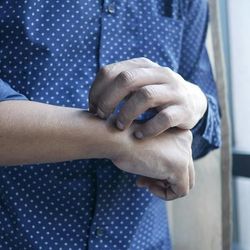An Expert Nurse Practitioner & Physician Assistant Exchange on the Management of Pediatric Atopic Dermatitis - Episode 10
Impact of Treatment Response Time on Pediatric Atopic Dermatitis Burden
Experts in dermatology comment on the impact of treatment response time on pediatric atopic dermatitis burden.
Melodie Young, NP: The rapid resolution, I think there's some discussion about that. You take that into account because you can use topicals for symptom relief and it still a minimal improvement. Whereas with these new systemic agents that we're seeing in the adult population, and dupilumab in this adolescent population, you can see rapid improvement in itch and scratch, then the disease seems to melt away when you can keep their paws from it. You can't just say don't scratch, it's not that easy. Matthew said long ago you had to learn biofeedback methods to keep yourself from scratching when you get older. As a kid, they can't. Rapid onset is also one of the selling points of these systemic therapies. Don't you agree? Even some of these new topical therapies will be shocking the way that we’ll see improvement with itch quickly.
Matthew Brunner, PA: That's one of the first things that people are reporting with agents like dupilumab, that immediate cessation itch within the first week or so of starting. Sometimes the skin's a little slower to change, just because the skin must heal, especially if there's a lot of lichenification, but that itch once we can get that under control, I feel like we can heal the skin. It's getting that itch there.
Melodie Young, NP: Itch is one of the most miserable things that we deal with in dermatology. Other orthopedic people deal with pain—rheumatology they deal with pain—and some of our patients have pain, and there are many meds to manage pain, but there's been very few things to manage itch. We would knock them out. You see a lot of people treat atopic dermatitis with systemic antihistamines and we know that it doesn't work. You can knock them out and keep them from scratching for a few hours so that they can sleep, but it's not effective, the itch is miserable. All you must do is have a good case of triggers or something that gives you a good itch, and for while you can see a glimpse into what these children, or these patients, deal with when you're so itchy that you can't be still. It's miserable. I wouldn't wish it on anyone.
Transcript Edited for Clarity


